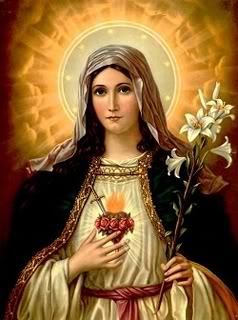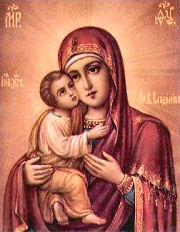
Month dedicated ...
Yesterday was the last day of July and
the Month of the Precious Blood has ended. August is the Month of the
Immaculate Heart of Mary.
August, 2014 - Overview for the Month
The month of August is dedicated to The Immaculate Heart of Mary. The entire month falls within the liturgical season of Ordinary Time, which is represented by the liturgical color green. This symbol of hope is the color of the sprouting seed and arouses in the faithful the hope of reaping the eternal harvest of heaven, especially the hope of a glorious resurrection. It is used in the offices and Masses of Ordinary Time. The last portion of the liturgical year represents the time of our pilgrimage to heaven during which we hope for reward.
General: That refugees, forced by violence to abandon their homes, may find a generous welcome and the protection of their rights.
Missionary: That Christians in Oceania may joyfully announce the faith to all the people of that region. (See also www.apostleshipofprayer.net)
The feasts on the General Roman Calendar celebrated during the month of August are:
1. Alphonsus Liguori, Memorial 2. Eusebius of Vercelli; Peter Julian Eymard, Opt. Mem. 3. Eighteenth Sunday in Ordinary Time, Sunday 4. John Vianney, Memorial 5. Dedication of St. Mary Major, Opt. Mem. 6. Transfiguration, Feast 7. Sixtus II and companions; Cajetan, Opt. Mem. 8. Dominic, Memorial 9. Teresa Benedicta of the Cross, Opt. Mem. 10. Nineteenth Sunday in Ordinary Time, Sunday 11. Clare, Memorial 13. Pontian and Hippolytus, Opt. Mem. 14. Maximilian Kolbe, Memorial 15. Assumption, Solemnity 16. Stephen of Hungary, Opt. Mem. 17. Twentieth Sunday in Ordinary Time, Sunday 19. John Eudes; St. Bernard Tolomei, Opt. Mem. 20. Bernard, Memorial 21. Pius X, Sunday 22. Queenship of Mary, Memorial 23. Rose of Lima, Opt. Mem. 24. Twenty-First Sunday in Ordinary Time, Sunday 25. Louis of France; Joseph Calasanz, Opt. Mem. 27. Monica, Memorial 28. Augustine, Memorial 29. Passion of Saint John the Baptist , Memorial 31. Twenty-Second Sunday in Ordinary Time, Sunday
The Gospel readings for the Sundays in August are taken from St. Matthew and are from Year A, Cycle 2.
 August is often considered the transitional month in our seasonal calendar. It is the time of the year we begin to wind-down from our summer travels and vacations and prepare for Autumn — back to school, fall festivals, harvest time, etc. The Church in her holy wisdom has provided a cycle of events in its liturgical year which allow the faithful to celebrate the major feasts in the life of Christ and Mary. Most notably, during August, we celebrate the feast of the Transfiguration (August 6) and the feast of the Assumption (August 15). August is often considered the transitional month in our seasonal calendar. It is the time of the year we begin to wind-down from our summer travels and vacations and prepare for Autumn — back to school, fall festivals, harvest time, etc. The Church in her holy wisdom has provided a cycle of events in its liturgical year which allow the faithful to celebrate the major feasts in the life of Christ and Mary. Most notably, during August, we celebrate the feast of the Transfiguration (August 6) and the feast of the Assumption (August 15).
The other main feasts of this month are St. Alphonsus Ligouri (August 1), St. John Mary Vianney (August 4), Dedication of St. Mary Major (August 5), Transfiguration of the Lord (August 6), St. Sixtus II and Companions and St. Cajetan (August 7), St. Dominic (August 8), St. Teresa Benedicta (August 9), St. Clare (August 11), Jane Frances de Chantal (August 12), Sts. Pontian and Hippolytus (August 13), St. Maximilian Kolbe (August 14), St. Stephen of Hungary(August 16), St. John Eudes (August 19), St. Bernard (August 20), St. Pius X (August 21), the Queenship of Mary (August 22), St. Louis of France (August 25), St. Monica (August 27), St. Augustine (August 28) and theMartyrdom of St. John the Baptist (August 29).
The feasts of St. Lawrence (August 10) and St. Bartholomew (August 24) fall on a Sunday so they are superseded by the Sunday Liturgy.
|









